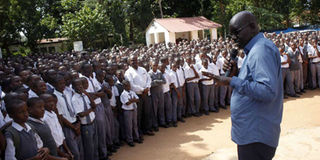Education ministry forms team to advise on new curriculum

Education Principal Secretary Dr. Belio Kipsang addressing students of Shimo La Tewa High School on July 10, 2018. A meeting of the National Steering Committee will take place at KICD offices. PHOTO | LABAN WALLOGA | NATION MEDIA GROUP
What you need to know:
- The team appointed by Education Principal Secretary Belio Kipsang is headed by Basic Education Director General Elyas Abdi.
- The team will also look at the financial implications of the new curriculum.
- The curriculum will be rolled out next year in January from Class One to Class Four.
The Ministry of Education has set up a special team to advise on where junior secondary school, which is part of the new curriculum to be rolled out next year, will be placed.
The team appointed by Education Principal Secretary Belio Kipsang is headed by Basic Education Director General Elyas Abdi and has members from various departments and parastatals from the ministry.
The team will determine whether junior secondary will be in primary school or secondary schools.
“The team will look at the infrastructure in school, recruitment and deployment of teachers, assessment of students and teacher preparation for pre-service,” said Dr Kipsang in a communication to Ministry officials.
The team will also look at the financial implications of the new curriculum. A student will take three years in junior secondary.
12 CORE SUBJECTS
At junior secondary, a learner will be required to take the 12 core subjects — including English, Kiswahili, Mathematics, Integrated Science, Health Education, Pre-technical and Pre-vocational Education, Social Studies, Religious Education, Business Studies, Agriculture, Life skills education, sports and Physical Education.
They will also take a minimum of one and a maximum of two subjects according to personalities, abilities, interests and career choices.
The optional subjects are Home Science, Computer Science, Performing Arts, Foreign Languages (German, French, Chinese and Arabic), Kenya Sign Language, indigenous languages and visual arts.
The curriculum will be rolled out next year in January from Class One to Class Four.
COMPETENCE-BASED CURRICULUM
The new curriculum will be implemented in phases to cover the entire pre-primary, primary and high school syllabus by 2027.
Class One and Two will be referred to as Grade One and Grade Two as per the Competence Based Curriculum.
Grade One to Grade Six will constitute the current primary school, Grade Seven to Grade Nine lower secondary while Grade 10 to Grade 12 will be the equivalent of upper secondary.
Pupils will sit for national examinations in Grade Nine. The current Standard One to Form Four will be replaced with Grade 1 to Grade 12.





